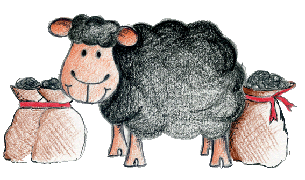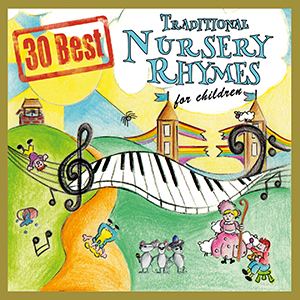The Nursery Rhymes Collections 1-4 contain a total of 277 children's songs. Each double CD album showcases the highest quality children's music ever recorded with a total playing time in excess of 10 hours!
Baa Baa Black Sheep (Full Audio and Lyrics)
Baa baa black sheep
Have you any wool?
Yes sir, yes sir, three bags full
One for the master and
One for the dame
One for the little boy
Who lives down the lane
(You try singing at home now.
And join in with me)
Baa baa black sheep
Have you any wool?
Yes sir, yes sir, three bags full
One for the master and
One for the dame
One for the little boy
Who lives down the lane
(Your turn to sing again, louder still!
I can't hear you!)
(Let's all sing together, last time!)
Baa baa black sheep
Have you any wool?
Yes sir, yes sir, three bags full
One for the master and
One for the dame
One for the little boy
Who lives down the lane
(Great singing, give yourself a round of applause)
Words & Music: Traditional
Arrangement: Ian J Watts/Mike Wilbury
Origin and background
 It can be supposed that a lot of people have heard the debate about whether the nursery rhyme “Baa, Baa, black sheep“ is racist and whether it should be banned from school.
It can be supposed that a lot of people have heard the debate about whether the nursery rhyme “Baa, Baa, black sheep“ is racist and whether it should be banned from school.
The supporter of this idea sees the a relationship between this song and the slave trade, but it is impossible to find any concrete facts supporting this affirmation. There is no doubt that the black sheep is a problem, but this problem has nothing to do with the colour of the sheep, but what the sheep can provide. Another issue is that the question, “Have you any wool?“ is directed to the sheep and that doesn’ t make any sense. This question could be addressed to the sheperd of the herd or to the owner, but not to a sheep. The correct version, which would word as well with the music, because the amount of syllables are the same would be:
Baa, baa, sheperd,
Have you any wool?
But we must admit that this doesn’ t work very well with the sheep’s cry of “baa, baa“. It seems that there is no logical reason for addressing the question to a sheep and therefore it is probably all about the phonetics. Concerning the colour BLACK sheep, some people may think of the famous “black sheep“ - a scoundrel, an outcast, someone out of the ordinary - but the widespread idea is that the song is about taxes imposed on wool in the middle ages.
In the middle ages there were a lot of sheep breeds and it is very well possible that all sheep were black, brown, white or speckled. Therefore, the expression “black sheep“ must be from a more recent date, because only in recent times are most of the sheep white. Black sheep, whose wool is mixed with white wool, have wool of a poorer value because it is more difficult, if not impossible, to dye. Therefore, nowadays black sheep often end up in the pot. If you want to know how many breeds of sheep actually exist you can go to this page:
http://www.nationalsheep.org.uk/
Unfortunately, we don’ t have any exact information about the breeds used in the middle ages. In this exhaustive study done by Eileen Power, Professor of Economic History at the University of London, we read:
As it is, all we can say about medieval breeds is largely a matter of inference and conjecture.
Therefore the expression “black sheep“ as used nowadays doesn’t make any sense if we talk about the middle ages, as it is quite possible that all sheep at that time were black. It is more plausible that the question was directed to a typical sheep bred for producing wool. In this case the “producer“ of the wool would be asked if he had any wool. That makes more sense than asking a person who goes his own way or a sheep who lowers the quality of the whole flock.
There is no doubt that there are no real “facts“ that could prove the assumption that the song is about the tax imposed on wool, but the only alternative we have, is to assume that the verses don’ t have any sense at all and that’s really very hard to believe. We know for sure, that the taxes imposed on wool was a big issue in the middle ages. Once again Eileen Power:
It is unnecessary to be Macaulay’s schoolboy to know that during the reigns
of the three Edwards a constitutional crisis matured and broke on the subject
of the taxation of wool. In this crisis three great forces in the country became
interlocked, the king, the parliament and the merchants, and we shall perhaps
do best if we start by enquiring what brought each of these forces into the
struggle, or in other words what was the interest of each in the wool trade.
It is not necessary and perhaps impossible to say who is the master, the dame and the little boy as detailed information about the way wool was produced in the middle ages would be needed. The ironic tune of the song reveals the truth. The little boy, who actually does most of the work, gets almost nothing. Eileen Power distinguishes three different groups involved in the issue: the king, the wool merchant and the wool grower. The assumption of Eileen Power is that the conflict arose due to taxes on the exported wool.
What these interests were is as clear to-day as it was to men of the middle
ages. There were first of all the merchants. All taxes on foreign trade were
negotiated with them up to 1340, but they were affected by those taxes quite
differently from the rest of the community. As long as the tax was not higher
than “the traffic would bear,” the merchants were of all classes least likely to
suffer.
What Eileen Power wanted to say is, that the merchants were able to buy the wool for a lower price if the taxes were raised, or to sell it for a higher price, keeping their income stable. The wool growers didn’t have these advantages. They really paid the taxes!
Regarding the melody, perhaps the situation is different. The melody seems to be from a more recent date. The same melody is used for “Twinkle, Twinkle little Star“ and “The Alphabet Song“. The first known version of the melody dates from 1761 in the song “Ah! Vous dirai-je, Maman“. The melody has been honoured, because there are variations of it from Wolfgang Amadeus Mozart (1756 – 1791).

